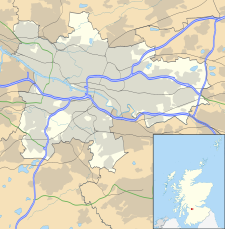Takin' Over the Asylum is a six-part BBC Scotland television drama about a hospital radio station in a Glasgow psychiatric hospital. The show was written by Donna Franceschild, produced by Chris Parr and directed by David Blair.

Claybury Hospital was a psychiatric hospital in Woodford Bridge, London. It was built to a design by the English architect George Thomas Hine who was a prolific Victorian architect of hospital buildings. It was opened in 1893 making it the Fifth Middlesex County Asylum. Historic England identified the hospital as being "the most important asylum built in England after 1875".

Stobhill Hospital is located in Springburn in the north of Glasgow, Scotland. It serves the population of North Glasgow and part of East Dunbartonshire. It is managed by NHS Greater Glasgow and Clyde.

Gartnavel Royal Hospital is a mental health facility based in the west end of Glasgow, Scotland. It provides inpatient psychiatric care for the population of the West of the City. It used to house the regional adolescent psychiatric unit but this has recently moved to a new psychiatric unit at Stobhill Hospital. The Hospital is a venue used by the Mental Health Tribunal for Scotland. Some parts of the hospital are classified as a category A building and are also deemed at risk.

Gartcosh is a village in North Lanarkshire, Scotland. The village lies about 8 miles east of Glasgow, and about 1 mile northwest of the town of Coatbridge.

Bangour Village Hospital was a psychiatric hospital located west of Dechmont in West Lothian, Scotland. During the First World War it formed part of the much larger Edinburgh War Hospital.

The Crichton is an institutional campus in Dumfries in southwest Scotland. It serves as a remote campus for the University of Glasgow, the University of the West of Scotland, Dumfries and Galloway College, and the Open University. The site also includes a hotel and conference centre, and Crichton Memorial Church, set in a 100-acre (40-hectare) park. The campus was established in the 19th century as the Crichton Royal Hospital, a psychiatric hospital.
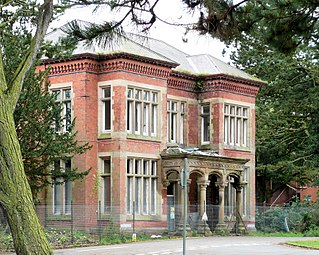
Whittingham Hospital was a psychiatric hospital in the parish of Whittingham, near Preston, Lancashire, England. The hospital opened in 1873 as the Fourth Lancashire County Asylum and grew to be the largest mental hospital in Britain, and pioneered the use of electroencephalograms (EEGs). It closed in 1995.

Woodilee Hospital was a psychiatric institution situated in Lenzie, East Dunbartonshire, Scotland.

Lennox Castle is an abandoned castle in Lennoxtown, East Dunbartonshire, Scotland, approximately 12 miles north of Glasgow. It is infamous for previously hosting Lennox Castle Hospital, Scotland's "largest institution for people with learning disabilities".
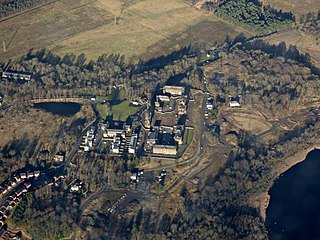
Gartloch is a residential village in Glasgow, Scotland. Outwith the city's urban area, it is very close to the boundary with North Lanarkshire, south of Garnkirk and west of Gartcosh. To the south is Bishop Loch, a nature reserve and the body of water referred to in the village name, which forms part of the Seven Lochs Wetland Park.

Hartwood Hospital was a psychiatric hospital located in the village of Hartwood near the town of Shotts in Scotland.

Stoneyetts Hospital was a psychiatric hospital located in Moodiesburn, near Glasgow. Opened in 1913, Stoneyetts served as an important source of employment for residents within the expanding Moodiesburn area. The function of the institution changed throughout its existence: it originally cared for those with epilepsy, before housing people with intellectual disability, and from 1937 treating those with mental disorders. By the early 1970s there was an emphasis toward psychogeriatric care at the hospital.

Bellsdyke Hospital, also known as Stirling District Lunatic Asylum ('SDLA') or Stirling District Asylum, is a former psychiatric hospital at Larbert, Falkirk council area that was opened in June 1869 and largely closed in 1997. It was an asylum set up by the Stirling District Lunacy Board.
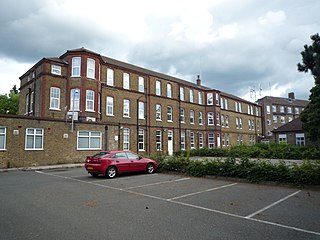
St Lawrence's Hospital was a mental health facility in Caterham, Surrey.

Leverndale Hospital is a mental health facility at Crookston, Glasgow, Scotland. It is managed by NHS Greater Glasgow and Clyde. The Towerview Unit, which has been taken out of use, is Category A listed.

The Royal Dundee Liff Hospital, previously known as Dundee Lunatic Asylum and Dundee Royal Lunatic Asylum, was a mental health facility originally established in 1812 in Dundee, Scotland. It was originally located in premises in Albert Street Dundee, but later moved out of the town to new buildings in the nearby parish of Liff and Benvie. Buildings at Liff included Greystanes House, which was the main building, and, Gowrie House, which was the private patients' facility. Both Grade B listed buildings.
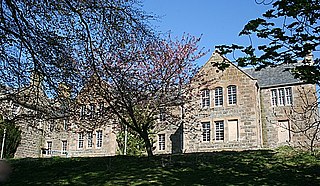
Ladysbridge Hospital was a mental health facility near Banff, Aberdeenshire, Scotland. The former hospital is a Category B listed building.

Argyll and Bute Hospital was a mental health facility in Lochgilphead, Scotland. The original building is a Grade C listed building. The hospital is managed by NHS Highland.

Dykebar Hospital is a mental health facility in Dykebar, Paisley, Renfrewshire, Scotland. The main building is a Grade B listed building. The hospital is managed by NHS Greater Glasgow and Clyde.

